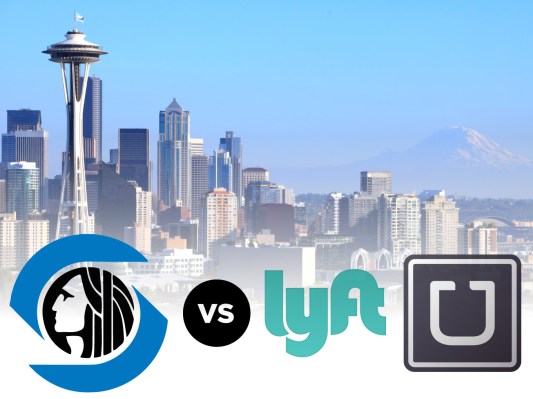In the biggest blow yet to ride sharing in the U.S., the Seattle City Council voted today to limit the number of drivers available on Uber, Lyft, SideCar, and other on-demand transportation services available in the city.
GeekWire has a pretty good live blog of what happened at the meeting, but the end result was that the city council sided with the taxi industry rather than allow newer transportation services to compete on their own merits.
By ensuring that companies like Lyft and Uber can have no more than 150 drivers on each platform, the vote essentially kills any competition to the city’s existing taxi regime. It also will render services like Uber and Lyft relatively useless, by ensuring that they won’t be able to keep up with demand.
In places like San Francisco and Seattle, these new transportation services have offered an alternative to taxis, which are limited by the number of medallions available in each city. That ensured that in times of high demand or in late night off hours, passengers typically weren’t able to get rides.
That all changed over recent years, thanks to the launch of Uber, Lyft, and similar services. By connecting passengers with drivers on-demand via mobile apps, the ride-sharing services were able to meet that demand.
But the new services didn’t adhere to the same regulations as existing taxi or black car services, which has caused some pushback from regulators in various markets.
Many questions about the new transportation network companies revolve around the issue of public safety, which the startups have sought to resolve with criminal and driver background checks, as well as $1 million supplementary insurance policies to cover drivers and passengers while a ride was underway.
Uber recently added insurance that covers accidents that might happen while a driver is in-between rides, and Lyft has announced plans to do the same.
Moves like that have helped ride-sharing startups to create greater clarity around their services and put some regulators at ease. In California, for instance, Uber, Lyft, and others were able to work with the state’s Public Utilities Commission to create a new framework for mobile-enabled transportation services.
The hope is that those companies will be able to get similar provisions adopted by regulators in other markets.
Surprisingly, the vote in Seattle happened despite the city being one of the first markets that Lyft, Uber, and other startups expanded into after conquering their home market of San Francisco. And it appears to be less about protecting public safety than it is about protecting the incumbent taxi industry.
That’s why the new regulations are more about the number of cars that can be on the road for any company — capped at 150 — rather than requirements for how the services are run.
While the new rules will protect jobs at taxi companies, mostly by ensuring that they have less competition, they mean that there will be fewer drivers in Seattle making a living wage from competing services. Uber, for instance, argues that the vast majority of its 1,000 drivers in the city will be forced out of work by the regulations.
There is also some controversy surrounding the process of how the vote came to light. Under the city council’s General Rules and Procedures, it’s required to provide fair notice of its agenda at least two business days prior to a vote, according to Uber.
The council waited until last Friday, however, to provide a full version of the regulations which will be voted on. And that version included several provisions that were not in earlier drafts. Furthermore, the new amendments to the bill changed the program from a temporary pilot program to a permanent regulatory scheme.
We’ve reached out to both Uber and Lyft for further comment, and will be updating once we hear back.
In a statement, Uber Seattle General Manager Brooke Steger writes:
“It’s astounding that that the City Council has chosen to ignore the voices of nearly 30,000 constituents and move to put hundreds of drivers out of work. This fight is not over, and as we explore our options, we urge Mayor Murray to reject the anticompetitive and arbitrary caps that will slingshot Seattle’s transportation ecosystem back into the Dark Ages.”
Meanwhile, Lyft spokesperson Erin Simpson writes the following:
Today, in a protectionist move that only serves the existing taxi and for-hire industries, the Seattle City Council voted to place severe limits on Lyft and other ridesharing platforms. These caps have no bearing on public safety, and the motivation behind these measures was planned behind closed doors. This vote makes Seattle the only city in the country to impose a cap on peer-to-peer transportation. In doing so, the Council is disregarding the voices of thousands of citizens who spoke out in opposition to these restrictions, and is crushing new economic opportunities for Seattle residents who have chosen to provide rides to their neighbors. We have worked closely with the local community to ensure safe, affordable rides remain available to all, and will continue this process in the weeks ahead with city and state leaders. Lyft will continue operating in Seattle, will continue to stand behind drivers, and will continue to offer a safe, affordable and friendly transportation option to the great city of Seattle.
Photo: Shutterstock
